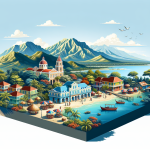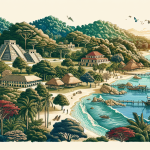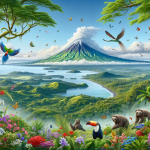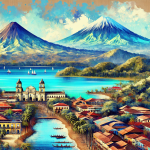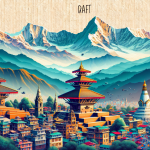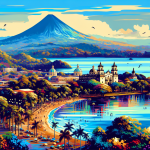Exploring the Wonders of Angola: A Journey Through Africa’s Hidden Gem
Angola, located on the southwestern coast of Africa, is a country that often flies under the radar for many travelers. With its rich history, diverse culture, and stunning natural landscapes, Angola offers an array of experiences for the adventurous soul. This country is much more than its turbulent past; it’s a land of untapped potential and hidden treasures. From the bustling capital city of Luanda to the serene beaches of Benguela, Angola provides a unique blend of urban and natural attractions that cater to a wide range of interests. Whether you are an avid historian, a nature enthusiast, or someone looking for a new and exciting travel destination, Angola has something special to offer. This comprehensive guide will walk you through the essential aspects of Angola, offering insights into its most captivating locations, cultural nuances, and practical travel tips to make your journey unforgettable. So, pack your bags and get ready to discover the wonders of Angola, Africa’s hidden gem.
Luanda: The Vibrant Capital
Luanda, the capital city of Angola, is a bustling metropolis that serves as the country’s economic and cultural hub. With a population of over 8 million people, Luanda is one of the fastest-growing cities in Africa. The city offers a fascinating blend of modernity and tradition, with towering skyscrapers standing alongside colonial-era buildings. The Marginal, a scenic coastal road, provides stunning views of the Atlantic Ocean and is a popular spot for both locals and tourists. The city’s vibrant nightlife, diverse culinary scene, and numerous cultural attractions make it a must-visit destination in Angola.
Historical Sites in Luanda
One of the most significant historical sites in Luanda is the Fortress of São Miguel, built by the Portuguese in 1576. This fortress played a crucial role in the defense of the city and now houses the Museum of the Armed Forces. Another notable site is the National Museum of Slavery, which offers a poignant look at Angola’s role in the transatlantic slave trade. For those interested in religious history, the Church of Our Lady of Remedies is a beautiful example of colonial architecture and a testament to Angola’s deep-rooted Christian heritage.
Modern Attractions
Luanda is not just about history; it’s also a city that embraces modernity. The Talatona Convention Center and the Belas Shopping Mall are prime examples of the city’s rapid development. For a taste of local culture, visit the Benfica Market, where you can find everything from traditional crafts to fresh produce. The city’s thriving art scene can be explored at the National Museum of Anthropology and various art galleries scattered throughout Luanda.
Benguela: The Coastal Paradise
Benguela, located on the western coast of Angola, is known for its stunning beaches and relaxed atmosphere. The city’s picturesque coastline offers a perfect escape for those looking to unwind and enjoy the natural beauty of Angola. Praia Morena and Baía Azul are two of the most popular beaches in Benguela, offering pristine sands and crystal-clear waters. The city’s mild climate makes it an ideal destination for beach lovers year-round.
Historical Significance
Benguela has a rich history that dates back to the 16th century when it was established as a Portuguese trading post. The city’s historic center is filled with colonial-era buildings, offering a glimpse into its past. The Church of Our Lady of Fatima and the Governor’s Palace are notable landmarks that showcase the city’s architectural heritage. For a deeper understanding of Benguela’s history, visit the Regional Museum of Benguela, which houses a collection of artifacts and exhibits related to the city’s past.
Outdoor Activities
For those who enjoy outdoor activities, Benguela offers a range of options. The nearby Serra da Chela mountain range is perfect for hiking and offers breathtaking views of the surrounding landscape. Water sports enthusiasts can indulge in activities such as snorkeling, diving, and fishing along the coast. The city also has several parks and gardens where you can relax and enjoy the natural beauty of the region.
The Natural Wonders of Angola
Angola is home to some of the most breathtaking natural landscapes in Africa. The country’s diverse ecosystems include lush rainforests, expansive savannas, and dramatic mountain ranges. One of the most famous natural attractions in Angola is the Kalandula Falls, one of the largest waterfalls in Africa. The falls are located in the Malanje province and offer a stunning display of nature’s power and beauty.
National Parks
Angola boasts several national parks that are home to a wide variety of wildlife. Kissama National Park, located near Luanda, is one of the most accessible and offers the chance to see elephants, giraffes, and other large mammals. The Iona National Park, located in the southwestern part of the country, is known for its striking desert landscapes and unique flora and fauna. For bird watchers, the Cameia National Park is a must-visit destination, with over 200 species of birds recorded in the area.
Rivers and Lakes
Angola’s numerous rivers and lakes offer additional opportunities for exploration and adventure. The Cuanza River, one of the longest rivers in Angola, is popular for activities such as fishing and boating. The river also plays a crucial role in the country’s hydroelectric power generation. The Lagoa do Arco, a picturesque lake surrounded by lush vegetation, is another popular spot for nature lovers. The lake is home to a variety of bird species and offers a tranquil setting for relaxation and reflection.
Angola’s Rich Cultural Heritage
Angola’s diverse culture is a reflection of its complex history and the various ethnic groups that call the country home. The country’s music, dance, and art are deeply rooted in African traditions, with influences from Portuguese colonialism and other cultures. The Angolan Carnival, celebrated in February, is one of the most vibrant cultural events in the country, featuring colorful parades, traditional music, and dance performances.
Traditional Music and Dance
Music and dance play a central role in Angolan culture. The country is known for its unique musical styles, such as Semba and Kuduro, which have gained international recognition. Semba, often considered the predecessor of Brazilian Samba, is characterized by its lively rhythms and danceable beats. Kuduro, a more contemporary genre, blends traditional Angolan music with electronic beats and is popular among the younger generation. Traditional dance forms, such as the Kizomba and Rebita, are also widely practiced and celebrated in Angola.
Art and Craft
Angolan art and craft are deeply influenced by the country’s cultural heritage. Traditional crafts, such as pottery, basket weaving, and wood carving, are still practiced by artisans throughout the country. The Chokwe people, one of Angola’s largest ethnic groups, are known for their intricate masks and sculptures, which are used in various cultural and religious ceremonies. The National Museum of Anthropology in Luanda houses a collection of traditional Angolan art and provides insights into the country’s cultural practices.
Practical Travel Tips for Angola
Traveling to Angola requires some preparation, but the rewards are well worth the effort. Here are some practical tips to help you plan your trip:
- Visa Requirements: Most travelers will need a visa to enter Angola. It’s advisable to apply for a visa well in advance of your trip.
- Health Precautions: Angola is a tropical country, so it’s essential to take health precautions. Make sure you’re up-to-date on vaccinations and take measures to prevent mosquito bites, as diseases such as malaria and yellow fever are prevalent.
- Currency: The official currency is the Angolan Kwanza (AOA). It’s advisable to carry some local currency for small purchases, although credit cards are accepted in major cities.
- Language: Portuguese is the official language of Angola. While English is spoken in some tourist areas, learning a few basic Portuguese phrases can be helpful.
- Transportation: Public transportation options are limited, so renting a car or hiring a driver is often the best way to get around. Be prepared for varying road conditions, especially in rural areas.
- Safety: While Angola is generally safe for tourists, it’s essential to stay informed about the current security situation and take common-sense precautions. Avoid traveling alone at night and keep your belongings secure.
By following these tips, you can ensure a smooth and enjoyable trip to Angola.
Final Thoughts: Why Visit Angola?
Angola is a country that offers a unique blend of natural beauty, rich culture, and modern attractions. Whether exploring the bustling streets of Luanda, relaxing on the pristine beaches of Benguela, or marveling at the natural wonders of the country’s national parks, Angola has something to offer every type of traveler. The country’s vibrant cultural heritage, reflected in its music, dance, and art, adds another layer of richness to the travel experience. While Angola may not be as well-known as other African destinations, it is a hidden gem that is well worth exploring. So, if you’re looking for a travel destination that offers adventure, beauty, and culture, consider adding Angola to your travel bucket list.
For more information on traveling to Angola, visit the [Official Tourism Website of Angola]

